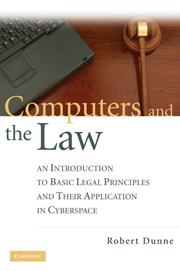Book contents
- Frontmatter
- Contents
- PREFACE
- ACKNOWLEDGMENTS
- 1 THE COMMON LAW AND STATUTORY LAW
- 2 CONTRACTS
- 3 TORTS INTRODUCTION
- 4 DEFAMATION
- 5 THIRD PARTY LIABILITY
- 6 COPYRIGHTS
- 7 TRADE SECRETS
- 8 TRADEMARKS
- 9 THE RIGHT OF PRIVACY
- 10 E-MAIL
- 11 THE RIGHT OF PUBLICITY
- 12 CONSTITUTIONAL LAW
- 13 PORNOGRAPHY AND OBSCENITY
- 14 ADVERTISING AND SPAM
- 15 JURISDICTION
- AFTERWORD
- INDEX
6 - COPYRIGHTS
Published online by Cambridge University Press: 05 June 2012
- Frontmatter
- Contents
- PREFACE
- ACKNOWLEDGMENTS
- 1 THE COMMON LAW AND STATUTORY LAW
- 2 CONTRACTS
- 3 TORTS INTRODUCTION
- 4 DEFAMATION
- 5 THIRD PARTY LIABILITY
- 6 COPYRIGHTS
- 7 TRADE SECRETS
- 8 TRADEMARKS
- 9 THE RIGHT OF PRIVACY
- 10 E-MAIL
- 11 THE RIGHT OF PUBLICITY
- 12 CONSTITUTIONAL LAW
- 13 PORNOGRAPHY AND OBSCENITY
- 14 ADVERTISING AND SPAM
- 15 JURISDICTION
- AFTERWORD
- INDEX
Summary
Introduction
Article I, Section 8 of the U.S. Constitution is the source of copyright law. It says:
The Congress shall have Power To…promote the Progress of Science and useful Arts, by securing for limited Times to Authors and Inventors the exclusive Right to their respective Writings and Discoveries.…
Note that the application of copyright law involves balancing the dual goals of, first, protecting intellectual property to provide an incentive for creators of new works and, second, generating “Progress” (i.e., permitting authors and inventors to build upon previous work).
Personal copyrights currently last for the life of the author plus seventy years; corporately owned copyrights last for ninety-five years (since corporations theoretically can “live” infinitely).
A copyright is created automatically in any original expression that is fixed in a tangible form – for example, in any original expression that is written or drawn on paper, or recorded on tape, or preserved on film, or saved to a disk. There is no longer a requirement that a copyright notice be posted on a copyrighted work. However, posting a notice that a work is copyrighted (“© 2009 by Jane Doe”) prevents an infringer from asserting the “innocent infringer” defense, claiming that the infringer did not know the work was copyrighted. The “innocent infringer” would still be infringing, but the copyright holder might be unable to collect damages.
There is no requirement that a copyright be registered, but the copyright holder must register the copyright before filing an action for infringement.
- Type
- Chapter
- Information
- Computers and the LawAn Introduction to Basic Legal Principles and Their Application in Cyberspace, pp. 100 - 158Publisher: Cambridge University PressPrint publication year: 2009



